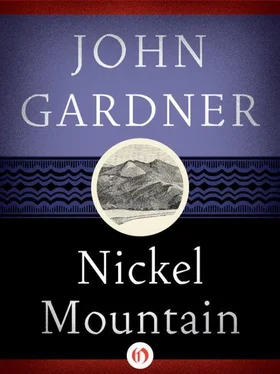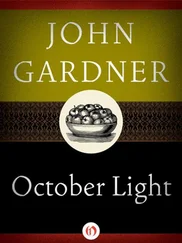“Simon,” Callie said, “you must see Henry’s garden!”
“Me too!” Jimmy said. He prepared his face for outrage in case they shouldn’t let him.
They laughed, even Simon (but horribly, Callie thought — forgiving him, though with some reservations, even as she thought it), and Henry got up and said, “Jimmy, you show Simon our rabbit tracks.”
Henry got Jimmy down out of his chair, and Callie helped Simon up and led him, as though he were an old, old man, toward the door. “Thank you,” Simon said. “Forgive—” He blew his nose, then straightened a little, flashing his idiotic smile, and looked out at the green morning. He nodded. “Praise,” he said. The cracks in the back of his neck were grimy, and his hair needed cutting.
“You want to take Simon’s hand, Jimmy?” Callie said.
Jimmy thought about it, looking at the man, and Simon leered at the little boy and held out his hand, a limp, raised claw, and waited as if in terror. Abruptly, Jimmy reached up for the hand. Henry laughed, and Callie, after a moment’s hesitation, laughed too.
Callie’s mother came down that afternoon to help out at the diner. She was a heavyish, determined little woman with iron-gray hair, a pretty face, dimpled elbows; “artistic,” she liked to say: She played the piano and organ at the church. She enjoyed working at the diner, which she tended to think of as Callie’s, not Henry’s. Certainly the place was greatly changed since Henry Soames had married Callie: new paint, clean linoleum, bright artificial flowers on the tables. Callie too had an artistic streak; no doubt she was a throwback to Uncle Al — Callie’s mother’s Uncle Al who’d done oil paintings of imaginary country scenes … among others, the picture in Callie’s dining room, called “Summer Evening.” Eleanor Wells had never thought highly of waitresses, but it was different now, in her own daughter’s place, her own grandchild running about, solemn-faced, his right arm sawing across the front of him as he ran. It was a family diner, as she liked to say, a place people brought their whole families to, and one of these days, who knew? they might expand it and make it a truly first-class restaurant, like the Chicken Pot, down in Slater. She’d gone so far as to mention it once or twice to Callie, and though Callie hadn’t said one word back, she’d listened, and she would think about it, you could see. After that Ellie Wells had taken to wearing her black hostess’s dress when she came to help out at the Stop-Off, with a little white apron she’d bought especially, and all she did she did with elegance. Her Frank would say (with a half-dozen curse-words she wouldn’t repeat), “No wonder men hate their mother-in-laws,” but he didn’t know a thing about it. Frank couldn’t understand Henry Soames like she could. Henry appreciated her help, and he respected her, he truly did. He would listen to anything she had to say with all the patience in the world (he was a good man, he truly was), and almost always, when he’d thought about it, he would come around to her way of thinking (something her Frank never did). That, as a matter of fact, was why she’d come here today.
She said nothing, however. She could tell from the minute she came in that there was something in the air, the way they pussyfooted, her daughter and Henry, but for the life of her she couldn’t make out if they were mad at each other or what. Jimmy was out in the garden with that man, and it was all Ellie Wells could do to shut her teeth and ignore it. She peeked out at them from time to time, when Henry and Callie were out of the room, and as far as she could see it was still all right. Just the same, it made her heart beat fast that he was there. Callie was just too innocent. “Just like a baby,” she thought. (It was just like that time at church camp, when she’d let that town man, a perfect stranger, comb out her hair, down by the lake. Or like the time she’d left her purse with that lady at the bus depot.) But Ellie polished the napkin holders and pursed her lips and waited.
The man just sat on the bench like a tramp. He had stubble on his chin and filthy-dirty clothes and a queer way of sitting with his knees and toes together and his heels thrown out to the sides. He had his hands on his knees and his calf-eyes riveted to the ground. Jimmy would talk to him sometimes, and the man would tip his head and smile and maybe pat him on the back and say a few words (she’d have given a half-dollar to hear what they were saying), and then he’d fall back into his staring fit, and, to Ellie Wells’ enormous relief, Jimmy would wander away.
Toward mid-afternoon, when she and Callie were alone in the diner, she said, “Where does Henry know him from, Callie?” As if it had just now happened to come into her mind.
“Know who, Mother?” Callie said. (Callie had always been like that, never letting on when things were bothering her. It had always made it hard, even when Callie was a little girl. It put you in the wrong when all you intended was truly her own good.)
“Why, your company,” she said, not quite as lightly as she’d intended.
(“Now damn you, Ellie, you leave them alone,” her Frank would say. “You keep away from there and mind your own business,” and he would bang his fist on his leg like a little boy having a tantrum. And, oh yes, that was fine to say, “mind your own business.” He’d minded his own business for fifty years, even when Callie was in trouble and no place to turn but Henry Soames. “They’re like children,” she’d said — that was this morning, before she’d come down. “They don’t know about people like that.” “Like what?” he’d said. Well she didn’t know, she would admit it, and maybe she was being a worry-wart, she’d admit that too, but what was she supposed to do, Henry Soames being the kind of man he was, and Callie even worse? It was so hard, trying to do the right thing. Why was that? Why couldn’t they be grateful?)
“Oh, you mean Simon Bale,” Callie said. “Simon’s an old, old friend of ours. He stops in all the time.”
Ellie Wells tipped her head and pretended to be satisfied. She rearranged the pies in the rack and dusted her hands and went over to see how the sugar dispensers were. She’d bet fifteen dollars that man had never been here in all his life. She made a clucking sound.
“It’s a terrible time for him,” Callie said. There was a hint of reproach in her voice. “His house burned down, you know, and he lost his wife in the fire. It’s really just terrible.”
“The poor thing,” Ellie said. There she was, put in the wrong as usual. She’d never said it wasn’t terrible.
“Didn’t you know?” Callie said. She looked straight at her, as if daring her to lie.
“Why, no,” Ellie said, “I hadn’t heard.” She did feel sorry for him, she truly did, but she didn’t have to like it that he was here. A man like that might do something crazy at a time like this. It was just one of those things. She said, “How long is he staying?”
“Oh, just a day or so, I think,” Callie said. She bit her lip as if she’d like to be able to take back that “I think.”
Ellie met her daughter’s eyes just long enough to let her know she had her own opinions. Then she said, “Poor man.” Then: “And poor Henry. He’s so good to people.” She dropped it casually, as if it meant nothing whatever (what it did mean, as a matter of fact, was vague in her mind). She had all the sugar dispenser tops off now. She went back to the kitchen for the sugar jar, and again, in misery, she began to cluck.
Doc Cathey came in a little after that and asked where Simon Bale was (straight to the point, as usual; no “How do you do” or “Nice weather we’re having”—nothing), and when she pointed to the bench in the garden Doc Cathey nodded, scowling, and went out to him. The next time she looked out the window Doc Cathey and Simon and Jimmy were all gone from sight. They’d gone on into the house, most likely. She wondered what Doc Cathey was doing here — up to no good, she was pretty sure — and it so puzzled her she forgot to smile at the customers for maybe five full minutes. She forgot, too, to listen to what the customers were saying among themselves, until finally it came to her that all they could seem to talk about, at least the people who lived around here, was the fire. Someone said, “They say he set it himself,” and she was so startled she nearly dropped her tray of salt shakers. It’s possible, she thought, and it was as if it had been in her mind all the while: It truly is possible. All at once she was so frightened that she had to sit down a minute till she’d caught her breath.
Читать дальше











